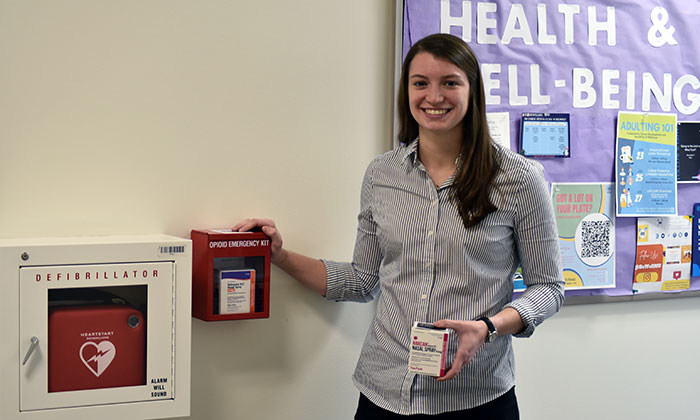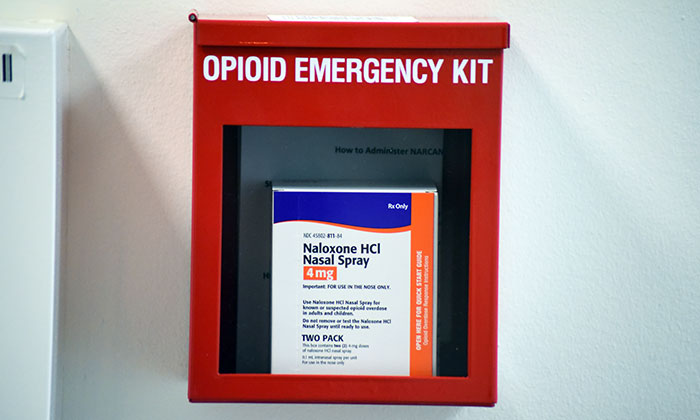For years, higher education institutions and other organizations have ensured that tools such as automated external defibrillators (AEDs) are available and accessible in case of emergencies. Now, in recognition of the devastating state of the national opioid crisis and with the aim of protecting others, Marymount University has expanded its NARCAN training program by adding emergency kits across its campuses while also increasing the number of group trainings available to community members.
Twenty-nine new opioid overdose emergency boxes were installed in December – 26 at Marymount’s Main Campus and three at its Ballston Center – all directly adjacent to AED locations. They provide anyone on University property with emergency access to the lifesaving medication NARCAN, while also helping to reduce stigma and normalize the drug as a common first aid tool.
“Our NARCAN training program is just the latest example of Marymount’s efforts to be a good neighbor in our Arlington County community,” said Dr. Irma Becerra, President of Marymount University. “Having this lifesaving drug available and accessible is so important for all higher education institutions today, and Marymount is leading the way on this critical initiative.”
NARCAN, also known as naloxone, is a medication that can safely and effectively reverse an opioid overdose from prescription painkillers, heroin and/or fentanyl. In Arlington County, Va., there have been 256 opioid overdoses since the beginning of 2020 – 67 of which were fatal. Nationally, the number of drug overdose deaths has risen consistently year after year – from about 48,000 in 2015 to approximately 110,000 in 2022. The Centers for Disease Control and Prevention (CDC) even announced late last year that life expectancy in the U.S. had dropped to its lowest mark in two decades, due in part to fatal overdoses.
This health crisis spurred Marymount’s Office of Wellness, Prevention and Education to partner with Arlington County Behavioral Health in August 2018 to launch a harm reduction initiative on campus. The partnership, in collaboration with Arlington County Opioids Program Manager Emily Siqveland and NARCAN Trainer Jim Dooley, has been built through three phases – building a solid foundation of trust and success followed by making harm reduction a priority on campus and in the community; expanding the number of Marymount participants who can learn how to care for and save others; and continuing to find innovative ways to train more students, institutionalize progress made and share lessons learned with other institutions.
Campus Safety officers were the first trained on how to dispense and use NARCAN, followed by a three-year period of NARCAN training classes offered twice a year to all community members. By late 2021, almost 150 students, staff and faculty had been trained.
However, slow and steady growth in Marymount’s NARCAN trainings transformed into an “explosion of interest” going into 2022. In her new role as Marymount’s Community Health Director, Aprile Preller elevated the initiative to a University priority in late 2021. Campus-wide trainings were then offered twice a semester instead of twice a year, all of Marymount’s Resident Assistants were trained on NARCAN and other harm reduction tools before students returned for the Spring 2022 semester and nearly 200 student-athletes and their coaches participated in group trainings together in early 2022.
These efforts resulted in the total number of trained students, faculty and staff more than tripling between August 2021 and August 2022, with a current total of 568 trained to dispense NARCAN so far.
“It has been truly beautiful to see how the Marymount community has come together to address the opioid crisis,” Preller said. “We are grateful for our partnership with Arlington County and even more grateful for how eager our campus has been to be a part of the solution. With each training, we are not only educating and destigmatizing the conversation, but we also may be saving countless lives. The impact of this program will be felt for generations to come.”
“NARCAN is safe to administer to anyone, and it’s one of the easiest ways to save a life. There aren’t negative side effects because its sole purpose is to knock opioids off of receptors in the brain, restoring normal breathing,” Dooley explained. “Basically, when in doubt, you should administer NARCAN because it can’t hurt during an emergency.”
“This year, I am making sure everyone on my residence hall floor knows that I have NARCAN available in my room, and they can come and talk to me about any concerns they have without feeling judged or stigmatized,” said Alexis Ferrell, a Resident Assistant in Marymount’s Berg Hall. “This harm reduction initiative at Marymount has empowered myself and others, and my dorm is definitely safer today thanks to this training.”
Marymount’s NARCAN training programs have already even impacted careers as well. Emma Driscoll, currently a CDC Foundation public health analyst for the Overdose Response Strategy working with the Arlington County Health Department, recently received a B.S. in Health Sciences from Marymount in 2021 and a M.S. in Public Health Education & Promotion in 2022. While at Marymount, she took advantage of every opportunity to expand her knowledge around the “ever-evolving overdose epidemic landscape.”
“A defining moment for me was being able to collaborate with Marymount and Arlington County personnel to help bring naloxone onto Marymount’s campus and embed it into the University’s culture. Now, in my current role, I am able to continue this collaborative work,” Driscoll said. “Marymount’s connection to the greater Arlington County community, commitment to service and emphasis on experiential learning all contribute to my knowledge and skillset that informs and supports my work today.”
Click here for more details on the Arlington Addiction Recovery Initiative, launched in 2017 in response to rising concerns pertaining to opioid abuse in the community. It offers free harm reduction tools through the mail, available by request via email or by filling out this form.
Marymount’s next NARCAN training, open to the general public, is scheduled for February 15 from 3:30-4:30 pm in the Ballston Center. For more info on this event or to find out how to create a similar program at another institution, please contact bewell@marymount.edu.






